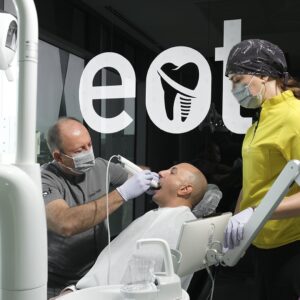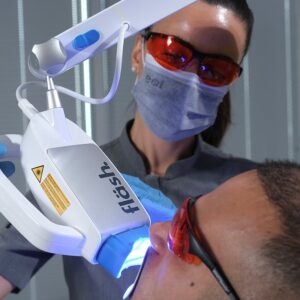General Questions
How long will I have to stay for my dental treatment?
The length of stay is determined by the treatment you wish to receive. For example, dental veneers take 4–7 days. You can contact us to learn more about your specific situation and to gain a better understanding of how long it will take.
How do I go about receiving treatment in your clinic?
Our prediagnosis service is free of charge. If you decided to come from abroad for treatment in our clinic, you should first go to a clinic, imaging center or hospital in your home country and obtain a panoramic dental X-ray which you can send to us along with any questions via WhatsApp (0090 533 598 56 71) or e-mail (eotankaradentalmail.com).
The treatment plan is decided upon after an examination of the radiological images by our dentists. We will then share the estimated cost and the predicted treatment duration with you. Please note that changes to the treatment protocol may be made after a clinical examination. You will then be given an appointment allowing you to plan your trip.
Do guarantee your dental treatments?
Issuing a life-long guarantee for dental implants or veneers is, unfortunately, scientifically impossible, although we stand by the treatments we provide. We do not envisage major problems related to our work, but can offer free-of-charge solutions for the duration of your stay, or in any subsequent trips to our country. Minor problems (tightening small screws, repairs, minor flaws, etc.) can be addressed by dentists in your home country.
Why should I come to Turkey for dental treatment?
The main reason for choosing our clinic for your dental treatments is the ease of access to high-quality, world-class dental treatment we promise at affordable prices. We offer high-quality dental treatments with cutting-edge technological equipment, conformity with universal sterilization and disinfection standards, fluent English-speaking health professionals and specialist dentists experienced in all fields of dentistry.
What dental health services do you provide?
- Implantology
- Dental veneer and bridges
- Positioners
- Root canal treatment
- Re-treatment
- Gum treatment
- Composite and ceramic dental fillings
- Smile design
- Teeth Bleaching
- Aligner Treatment
- Sedation & General Anesthesia Dentistry
- Pediatric Dentistry
- Preventive Dentistry
- General oral health screening and oral cancer screening
- Temporomandibular joint treatment
- Safe mercury amalgam removal
Do you have the necessary equipment for patients with special needs?
We have the necessary experience and equipment for the treatment of patients with special needs. Our auxiliary staff will take good care of you for the duration of your stay with us. We can also provide special sedation and general anesthesia services for patients prone to anxiety.
Can you give me an idea of the costs of treatment?
Detailed dental treatment costs can be found in the Dental Treatment Costs section.

Dental implant Ankara
Questions about the implants
Are implant treatments suitable for everyone?
Anyone who has lost a tooth can benefit from implant treatments, based on an evaluation of the systemic and overall health status of the patient. As the placement of normal dental implants is no more traumatic than the surgical removal of a tooth, dental implants can be fitted using the appropriate protocols in any patient capable of undergoing tooth extraction, with the ultimate goal being to provide the patient with a quality chewing function.
What are the advantages of dental implants?
In dental implants, a titanium screw mimics the tooth root. In the presence of an appropriate indication and with the correct application, dental implants allow the replacement of lost teeth without touching the neighboring teeth in patients with several missing teeth. It allows quality (fixed or mobile) chewing in fully toothless patients, while also preventing the bone resorption and bone loss associated with total prostheses in the long term.
How many times will I have to visit the dentist for a dental implant?
With the existing technologies and under the current conditions, implants can be placed in the same session as a tooth extraction. In other words, depending on the site of implantation and the number of implants, the surgical stage can be completed in 1–2 sessions, that is, over a maximum of 1 week. Then, 7–8 days after the completion of the osteointegration phase (union with the bone), the prosthesis is finished in 2–4 sessions.
How long does a dental implant take?
Under appropriate conditions (that is, if bone powder or major surgery are not required), a single implant can be made in around 10 minutes in experienced hands.
Is the brand of the dental implant important?
The brand of the implant is important, and the patient must know which brand of implant they have been fitted in case of minor complications (loose screw, etc.) that may occur in the future. Our patients purchase not the implant, but the application of the implant (surgery and prosthetic). For this reason, many factors such as the doctor’s experience with the brand, the range of surgical and prosthetic options of the brand, and the digital dentistry network of the brand all affect brand selection. The brands used in our clinic provide global spare part support. They have gained acceptance in scientific literature and all are applied with peace of mind.
Can I learn the price of implant treatments?
Of course, detailed dental treatment costs can be accessed in the Dental Treatment Costs section.
Is there a specialized branch of dentistry for dental implants?
Dental implant procedures are carried out by our clinic by Assoc. Prof. Erhan Dursun, who has numerous international publications in this field, provides education across the country, and has been an invited speaker at several national and international congresses.
What is the lifespan of a dental implant?
There is no fixed lifespan for dental implants if placed using the appropriate surgical and prosthetic techniques, although providing a lifelong guarantee for such treatments is not scientifically viable. This treatment is offered to patients who have lost their own teeth, and while dental implants do not decay, problems may occur in the tissues around the implant in patients who are prone to gum disease. For this reason, dental implant treatments should be considered a long-term solution, provided that the patient pays attention to personal oral hygiene and keeps up with regular controls. We have many patients registered with our clinic who continue to be followed up 20 years after having undergone dental implant treatment.
What kind of problems can occur related to dental implants?
The leading complication encountered with appropriately placed implants is non-union with the bone tissue, which occurs in 1–2% of cases. Other potential complications include injury to important anatomical structures, such as the maxillary sinus and mandibular nerve, which may occur as a result of inappropriate planning and lack of experience. The possible complications are minimized in our clinic through the use of 3-dimensional radiological imaging (CBCT) and appropriate treatment planning by our experienced doctors.
How many doctors in your clinic carry out dental implant surgery?
All surgical procedures, including dental implant surgeries, are carried by Assoc. Prof. Dr. Erhan Dursun in our clinic.

Porcelain Veneers
Questions related to implant-top prostheses, veneers and bridges
When can I have a veneer/bridge/prosthesis performed over the dental implant?
Veneers or bridges can be applied around 2 months after the placement of an implant in the lower jaw, and 3–4 months after implants in the upper jaw.
Can veneer/bridge/prosthesis be performed on the same day as dental implant placement?
Particularly in cases of front tooth loss, both the implant and the temporary prosthesis can be placed on the same day using a method we refer to as immediate placement and loading protocol. Similarly, temporary dentures can be placed with surgery on the same day in completely toothless patients with the aid of 3-dimensional digital dentistry methods. Accurate and precise planning, together with the appropriate prosthetic positioning of the implant placement, is important in meeting these conditions.
Can the veneers/bridges on the implant chip?
The prostheses placed on the implant are sometimes fixed with screws and sometimes with glue. Loose screws and chipping of the crown are always possible, but are uncommon in our practice. In brief, our patients will be able to use their prostheses for many years.
What materials are used in implant-top veneers/bridges?
Zirconium crowns are more common nowadays, the main reason for this being the greater biological compatibility of zirconium with the gum than with other materials. Other than zirconium, porcelain fused to metal crowns are also common.
How long does it take for the fitting of tooth veneers and bridges?
Depending on the number of items in the prosthesis, zirconium crowns and bridges are completed in 2 sessions, while porcelain fused to metal crowns are completed in 3 sessions.
The production of the prosthesis after the dental implant placement takes 4–15 days, depending on the type and number of prostheses. For prosthesis treatments lasting 15 days, the patient does not have to remain in the city in which they are receiving treatment, as there are gaps of 3–4 days between appointments.
What is the average lifespan of tooth veneers/bridges?
Tooth veneers/bridges can last for 10–15 years with appropriate maintenance if the patient brushes their teeth at least twice daily and flosses at least once. Regular yearly visits to your dentist should be maintained to identify any problems before they get worse.
Is root canal treatment necessary before tooth veneering?
No, root canal treatment is not necessary before tooth veneering, although a tooth that has undergone root canal treatment may require tooth veneering for protection.

Teeth Whitening ankara
Questions about smile design
Which stages are followed in smile design?
- Intraoral examination
- Determining patient preferences
- Bleaching, if necessary
- Planning of implant placement or bridging in the event of lost teeth
- Smile design based on the relationship between the jaws and teeth
- Preparation of the teeth and gums according to the planned smile design (aligning the gum where required)
- Transfer of the design into the mouth using temporary materials
- Permanent application of the design to the teeth after gaining patient approval
Can I change the shape and size of my teeth?
Giving you a new smile that we determine together is possible using composites and veneers, as far as the relationship between the jaws and teeth permits.
Can the gaps between my teeth be closed without dental braces?
It is possible to close gaps between teeth using composite and ceramic laminate veneers.
Can I see my smile design beforehand?
Of course! We have the ability to design the smile you wish to have and decide on the final appearance based on the records obtained using 3-dimensional scanners and professional photographs transferred to our experienced dental technicians.
How long does smile design take?
The smile design procedure takes around four sessions over 7–10 days, involving a preliminary interview and the taking of measurements, the temporary transfer of the design to the teeth, the preparation of the teeth and further measurements, and the fitting of the design and gluing of the design to the teeth.

Dental Bleaching Ankara
Questions about dental bleaching
Who can undergo teeth whitening?
In general, anyone who has healthy gums and teeth and who wants a whiter smile can benefit from a professional tooth-whitening system. Teeth whitening is a highly effective approach to the removal of yellow coloring and stains from the teeth, including those produced by tobacco, coffee, tea and various other substances.
Is the teeth whitening process effective on existing restorations such as fillings and porcelain veneers?
Professional teeth-whitening systems are ineffective on existing restorations such as tooth colored-fillings, dentures, crowns, bonding, porcelain veneers, bridges etc. As such, if a patient chooses to undergo a whitening process, any pre-existing dental restorations may need to be replaced to match the new color achieved in the natural teeth.
Is teeth whitening harmful to teeth?
Professional teeth whitening is considered harmless by most dental health professionals.
Is teeth whitening painful?
Teeth whitening can cause sensitivity in the gums and teeth during and after the procedure, although these side effects are temporary and disappear after a few days.
How many shades whiter will my teeth become?
The level of whitening may vary from patient to patient and from tooth to tooth, and cannot be predicted or guaranteed. In general, teeth can be lightened by 6–12 shades according to the whitening color guide.
How long does tooth whitening last?
The permanence of the teeth whitening process depends on personal habits, and may be reduced by the frequent consumption of colored foods, smoking, and coffee and tea.
The permanence of teeth whitening is 2 years on average in people who exercise good oral care.
How long does the treatment take?
Teeth whitening takes 45 minutes, including the double application of the whitening gel, taking 15 minutes each, and the protective application, taking a further 15 minutes.
Office bleaching applications can be repeated after an interval of 2 days if considered necessary for very stained teeth.
How can I make my teeth whitening results last longer?
Limiting the consumption of colored drinks and foods such as tea, coffee, strawberries, cherry, tomato sauce, etc. during the bleaching process, and for 2 weeks after, will prolong the permanence of the whitening.
In addition, twice-daily brushing and having your teeth professionally cleaned once a year can help prevent stains from forming on your teeth.

root canal treatment
Questions about root canal treatment
Why would I need root canal treatment?
When the pulp within the tooth becomes infected due to decay, faulty or deep fillings, or due to gum problems, it needs to be removed. Untreated infections become painful and lead to the development of abscesses.
Should painful teeth be extracted or subjected to root canal treatment?
Root canal treatment is a treatment option that can lead to the retention of the tooth, which can remain problem-free for many years after. Tooth extractions impair the balance of the entire chewing system and can create additional problems and needs. Root canal treatment should always be preferred for eligible teeth. You should not give up your natural teeth unless your root canal specialist informs you of a different problem specific to your condition. Root canal specialists possess the required skills and equipment to carry out the necessary treatments to save your tooth.
Is root canal treatment painful?
Root canal treatments are no more annoying than normal fillings, and are the only way of relieving the intense pain that comes from infected teeth. The site is numbed with local anesthetics prior to treatment to ensure a painless experience.
How many sessions do root canal treatments take?
Root canal treatments can be completed in a single session using the current scientific knowledge and special materials, although a second session may be required in some cases.
Do I need root canal treatment even if I do not have toothache?
The conditions requiring root canal treatment do not always overlap with pain. Teeth with infected root tips that have not been a problem for the patient are commonly encountered. In such cases, the teeth serve as a local foci for infection and encourage the spread of microorganisms into the body. Such teeth should undergo root canal treatment even if they are not causing the patient pain.
Do root canal treatments weaken the tooth?
The primary mandatory option in cases of severe tooth pain and tooth abscesses is root canal treatment. The evacuation of the inside of the tooth weakens the overall tooth structure, although it is possible to strengthen the tooth structure using onlay restorations, supported by fiber posts or tooth crowns. We provide the most appropriate treatment to ensure the strength of your tooth after completing a root canal treatment.
What awaits me after root canal treatment?
Once the numbness subsides, you will not have the severe pain experienced previously, although some sensitivity may be felt for a couple of days after the procedure as the surrounding tissues heal. Eating soft foods and painkillers may be beneficial during recovery.

dental clinic ankara
Questions about gum diseases
Why does gum disease occur?
Plaque that is rich in bacteria can develop on your teeth, and particularly at the junction of teeth and gum, causing gum disease. Other important risk factors for the development of gum diseases are smoking, diabetes, stress and pregnancy.
Is gum disease treatable?
Gingivitis is a gum infection that is reversible with appropriate and professional care.
If gum disease affecting the surface tissues extends to the deeper tissues, it can cause permanent damage to the connective tissue and the bone that supports and holds the teeth together, which will require further treatment. If not treated, the condition may cause abscess formation and lead eventually to tooth loss.
Questions about impacted teeth
Is the removal of an impacted wisdom tooth a must?
Extraction may not always be necessary for impacted wisdom teeth. Your dentist will assess your symptoms and the risk of later complications before deciding whether a tooth extraction is necessary. They may decide regular controls of impacted wisdom teeth are necessary.
Is the removal of an erupted wisdom tooth a must?
The common belief that wisdom teeth must be removed is erroneous. There are no grounds supporting the extraction of a wisdom tooth that has erupted normally, that is positioned accurately and that is causing no complications.
Nowadays, it is very rare to observe a correctly positioned and complication-free wisdom tooth. Impacted or partially impacted wisdom teeth can cause crowding, tooth decay, gum infection and cysts, etc., and should be extracted in such circumstances.
In how many days after the extraction of a wisdom tooth can I return to my normal life?
Healing often takes a couple of days, and so you may need to take time off work after the procedure to recover. In rare cases, swelling, mild pain and restricted mouth opening may be experienced for a week after the procedure.
Questions about aligner treatment
Why should I opt for aligners?
Most people in the past opted for ceramic and metal braces. Reese, would cause self-confidence problems in some individuals while smiling. Aligners were developed as a modern alternative to dental braces. Most people will not notice aligners from a distance due to their transparent and thin structure. There are no sharp wires that may cut the tongue or cheek, and they can easily be removed while eating. Furthermore, aligners do not require the monthly activation appointments required with metal braces, which is particularly important for patients coming from abroad.
The application of aligners requires maximum 2–3 weeks for the diagnosis, planning, teeth preparation and delivery of the aligners to be used throughout the entire treatment process. At the end of the treatment (six months to 1 year), and additional appointment can be arranged for the removal of the bittons from the teeth, although you may seek help with this from a dentist in your home country.
Are aligners suitable for everyone?
Those with mild to moderate orthodontic problems can benefit most from aligners. For people with severe crowding or large gaps between their teeth, those with jaw and tooth problems, and cases in which impacted teeth have to be erupted, the use of fixed metal and ceramic braces may be more appropriate.
Questions about pediatric dentistry
When to take my children to the dentist for the first time?
If you see a tooth in your child’s mouth, it’s time to go to the dentist, and usually your child’s first teeth begin to appear in their mouth at 6 months of age.
We also recommend making an appointment immediately if you notice anything abnormal (white spots, lesions, bleeding, etc.) in your child’s mouth.
Why should I take my child specifically to the pediatric dentist?
Pediatric dentists are experienced in how to make a seemingly frightening experience fun for your children, and the more fun your child’s visits to the dentist are, the happier your children may be with a six-month visit to the dentist for checkups.
Do baby teeth need restoration?
The common question asked to the dentist is: Why should we restore primary teeth? They’re going to fall anyway. There are several reasons why milk teeth are important and properly cared for.
- They are the only teeth your child has at this point in his life. Although milk teeth are thought to be only “temporary” teeth, this temporary period covers the first 12 years of a child’s life. Milk teeth are as important for the child in this period as permanent teeth are for you.
- The anatomy of primary teeth is similar to permanent teeth and is also susceptible to decay. When the caries reaches the nerve, an abscess develops at the root end, resulting in pain and swelling.
- Baby teeth provide proper nutrition and speech development of the child during the developmental period, therefore they are necessary.
- Primary teeth act as natural placeholders and act as a guide for permanent teeth to erupt into their normal position.
Is anesthetized dental treatment risky in children?
Dental treatment under anesthesia is carried out in health institutions with general anesthesia conditions in accordance with the Universal Guidelines for General Anesthesia and Sedation Practices in Dentistry, accompanied by an anesthesiologist, with a pediatric dentist and an experienced team to assist him.
It is a preferred application for patients with very high levels of fear and anxiety, or children with insufficient cooperation, and children with special needs, if necessary.
Dental treatment is carried out without risk, by providing the necessary conditions in a fully-equipped hospital environment with which our clinic is contracted.
